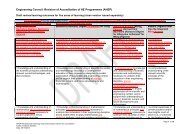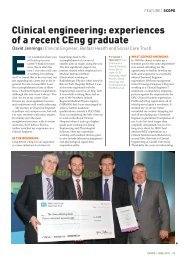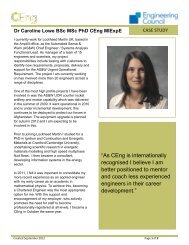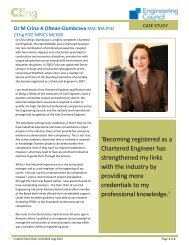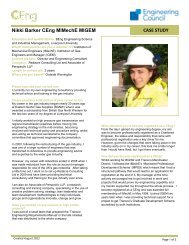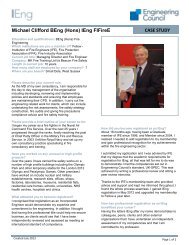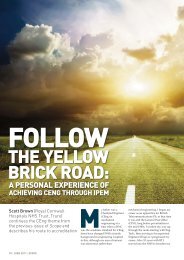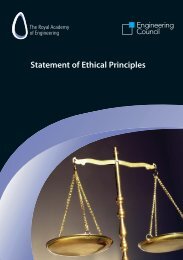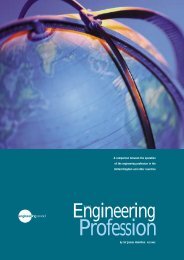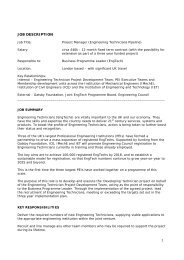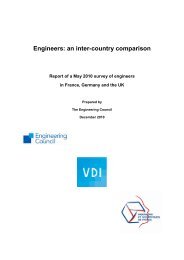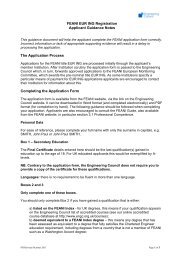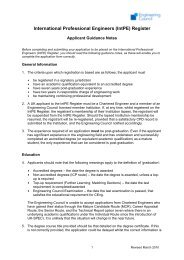An Engine for Change - A Chronicle of the Engineering Council
An Engine for Change - A Chronicle of the Engineering Council
An Engine for Change - A Chronicle of the Engineering Council
Create successful ePaper yourself
Turn your PDF publications into a flip-book with our unique Google optimized e-Paper software.
1996-1998: THE RUDGE YEARS 123suitably audited and licensed. These powers were delegated to executive committees.Comments from many quarters on ‘Competence and Commitment’ influenced early drafts <strong>of</strong>a new edition <strong>of</strong> ‘Standards and Routes to Registration’ (SARTOR), – as we described inChapter 5.To facilitate <strong>the</strong> move to licensing <strong>of</strong> Institutions as Nominated Bodies, a comprehensivereview <strong>of</strong> acceptable qualifications <strong>for</strong> candidate registration, undertaken by Terry Smith,resulted in <strong>the</strong> publication <strong>of</strong> Individual Case Procedure (ICP) Guidelines <strong>for</strong> Chartered<strong>Engine</strong>er, Incorporated <strong>Engine</strong>er and <strong>Engine</strong>ering Technician. These guidelines would, withhindsight, have been more correctly termed Registration Guidelines. The philosophy <strong>of</strong>licensing (as opposed to nomination) was that Institutions would undertake all <strong>of</strong> <strong>the</strong> workassociated with registration – including those parts <strong>of</strong> <strong>the</strong> candidate assessment <strong>for</strong>merlyconducted by <strong>the</strong> EngC. The ICP Guidelines drew heavily on <strong>the</strong> knowledge <strong>of</strong> <strong>the</strong> Chairmen<strong>of</strong> <strong>the</strong> <strong>for</strong>mer CCC and CCIT, Pr<strong>of</strong>essor Len Jones and Brigadier Lonsdale, as well as on <strong>the</strong>expertise <strong>of</strong> Philip Hawkin, Chairman <strong>of</strong> EGC4, Dr Denys Armstrong and Mrs ConnieTopping, <strong>the</strong> EngC’s Qualifications Executive. Dr Armstrong’s outstanding contribution as avolunteer to <strong>the</strong> EngC was recognised in 1996 when he was presented with a Rose Bowl, <strong>the</strong>EngC’s highest award.This is an appropriate point at which to mention <strong>the</strong> vast amount <strong>of</strong> unpaid peer assistancethat Registrants and o<strong>the</strong>rs have given to <strong>the</strong> EngC over <strong>the</strong> years. Without <strong>the</strong> time andexpertise that <strong>the</strong>se volunteers have freely given to its committees, working groups, panelsand o<strong>the</strong>r activities, <strong>the</strong> EngC could never have pursued its policies or achieved its aims andobjectives.The new BER contributed in 1996 to national developments in fur<strong>the</strong>r education and highereducation and qualifications. These included implementation <strong>of</strong> <strong>the</strong> Dearing Report(qualifications framework <strong>for</strong> 16-19 year-olds), <strong>the</strong> Beaumont Report (NVQs) and <strong>the</strong> CapeyReport (GNVQ assessment), and also <strong>the</strong> transition from <strong>the</strong> EOSG to its successor body <strong>the</strong>Occupational Standards <strong>Council</strong> <strong>for</strong> <strong>Engine</strong>ering (OSCE). The OSCE was <strong>for</strong>mallyestablished in 1997 with representatives from industry, national training organisations,pr<strong>of</strong>essional bodies, universities and trades unions.In its work in regulating <strong>the</strong> pr<strong>of</strong>ession during 1996 and 1997, <strong>the</strong> BER maintained closelinks with <strong>the</strong> Institutions’ NVQ Forum, <strong>the</strong> Joint Board <strong>of</strong> Moderators and <strong>the</strong> JointAccreditation Board operated by co-operating groups <strong>of</strong> licensed Institutions and bodiesrepresenting higher and fur<strong>the</strong>r education. To undertake its programme <strong>of</strong> work <strong>the</strong> BER setup a number <strong>of</strong> task groups or committees. In 1996 this work involved marketing <strong>the</strong> Registerand reviewing <strong>the</strong> activities <strong>of</strong> <strong>the</strong> Statutory Powers Working Group – embracing a study <strong>of</strong>EN 45013 (certification <strong>of</strong> competent persons), reviewing <strong>the</strong> Code and Rules <strong>of</strong> Conduct,embracing CPD and <strong>the</strong> EngC’s existing Codes <strong>of</strong> Practice, one relating to risk and ano<strong>the</strong>r to<strong>the</strong> environment. In September 1996, <strong>the</strong> accredited list ‘<strong>Engine</strong>ering Courses – <strong>the</strong> 1997Official Guide’ was published and in February 1997 ‘<strong>Engine</strong>ering Our Future’ was publishedin association with <strong>the</strong> EEF and <strong>the</strong> DTI.The BER also continued in its remit to regulate <strong>the</strong> pr<strong>of</strong>ession in 1997 by setting up executivecommittees in <strong>the</strong> areas <strong>of</strong> Nomination and Audit, International Affairs and RegistrationStandards. It master-minded <strong>the</strong> development <strong>of</strong> a third edition <strong>of</strong> SARTOR, at <strong>the</strong> timeknown as SARTOR97 but later termed SARTOR-3.© <strong>Engine</strong>ering <strong>Council</strong> UK 2004



